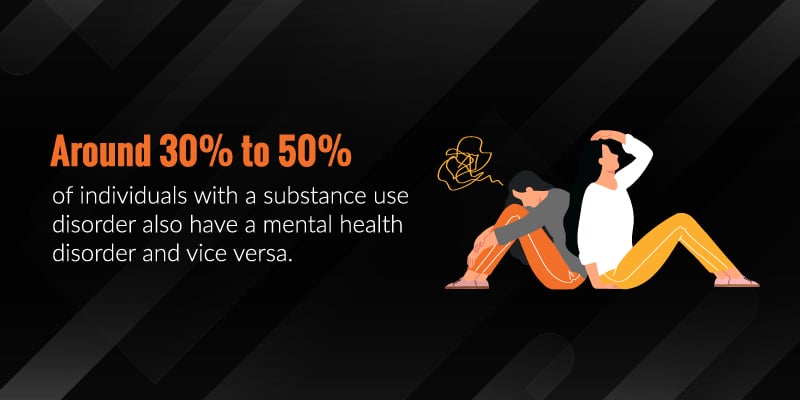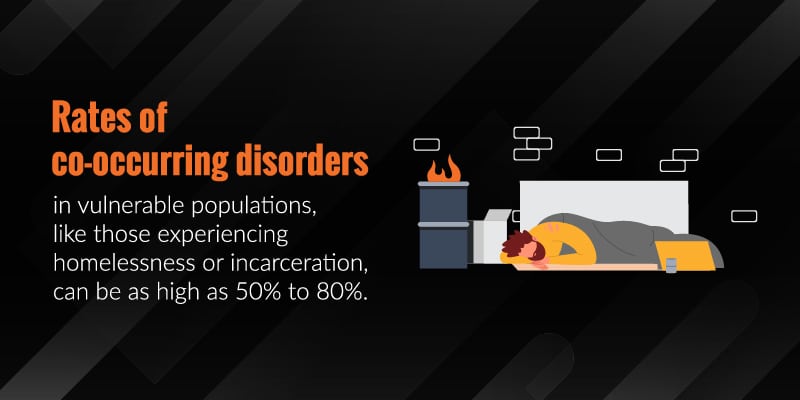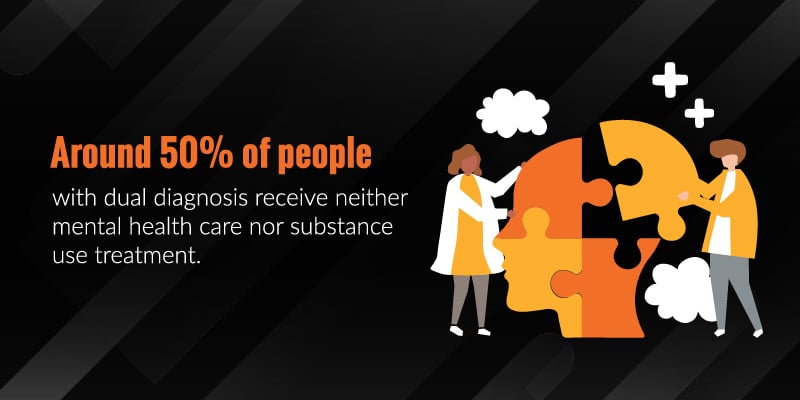Dual Diagnosis Treatment Denver Residents Can Rely On
Looking for dual diagnosis treatment Denver residents can rely on? Discover comprehensive and integrated care at Mile High Recovery Center.
What is Dual Diagnosis?
Dual diagnosis is when an individual has both a mental health and substance use disorder at the same time. Treating these disorders concurrently is imperative for overall healing. Finding dual diagnosis treatment Denver residents can rely on can help get you the support you need.1
The term “dual diagnosis” acknowledges the coexistence of these two conditions. The presence of both disorders can complicate the diagnosis and treatment process. This is because both disorders often interact and influence each other.
For example, substance use disorder (SUD) may worsen or create mental health symptoms, and mental health issues can increase the risk of substance abuse as a coping mechanism.

What Does Dual Diagnosis Treatment Denver Programs Consist of?
- Therapy
- Medication management
- Support groups
- Behavioral interventions
Addiction treatment - programs
A Closer Look at Dual Diagnosis
The Relationship Between Substance Use Disorders and Mental Health Challenges
Self-Medication
People with mental health challenges may turn to substances as a way to self-medicate and ease their symptoms.
Drugs or alcohol can provide temporary relief from distressing symptoms like anxiety. However, this self-medication strategy is not effective and can lead to a cycle of addiction.
Neurochemical Imbalances
Both substance misuse and mental health disorders can affect the brain’s chemistry. Substance use disorder can disrupt the natural balance of neurotransmitters. This imbalance can lead to changes in mood and behavior.
Also, mental health disorders are often associated with imbalances in neurotransmitters. This can contribute to symptoms such as depression or anxiety.
Genetic and Environmental Factors
There is evidence to suggest that genetic and environmental factors contribute to both mental health disorders and substance abuse.
Some individuals may have a genetic predisposition to develop both conditions, which is called “dual vulnerability.”
Environmental factors, such as trauma or a history of substance abuse in the family, can increase the risk of someone developing either a mental health or substance use disorder.
Co-Occurring Risk Factors
- Social isolation
- Lack of social support
- Exposure to chronic stress
Understanding that Risk Factors Don’t Make Dual Diagnosis Inevitable
While SUD can exacerbate mental health symptoms and vice versa, not everyone with a mental health disorder will develop a substance use disorder.
However, the co-occurrence of these conditions is relatively common, and receiving the dual diagnosis treatment Denver offers is crucial for effective treatment.

The Most Common Dual Diagnosis Disorders
If you’re searching for dual diagnosis treatment Denver programs, it is important to understand what disorders interact with each other the most.
The most common co-occurring disorders vary depending on the population and the context, but some combinations occur more often than others. Here are a few examples:
Depression and Substance Use Disorder
Depression is one of the most common mental health disorders, and it often co-occurs with substance use disorders. People experiencing depression may turn to substances to self-medicate. The use of drugs or alcohol may temporarily ease emotional pain and provide a sense of relief.
Many of the dual diagnosis treatment Denver programs provide assistance for both depression and substance use disorder.
Anxiety Disorders and Substance Use Disorder
- Excessive worry
- Fear
- Physical symptoms
Bipolar Disorder and Substance Use Disorder
Post-Traumatic Stress Disorder (PTSD) and Substance Use Disorder
- The distressing symptoms
- Numbing emotional pain
- Attempting to self-soothe
Schizophrenia and Substance Use Disorder
- Hallucinations
- Delusions
- Disorganized thinking
- Social withdrawal
Substance use disorders are more prevalent in individuals with schizophrenia compared to the general population.
Substance misuse may be an attempt to reduce hallucinations. However, it can increase cognitive impairment and negatively impact treatment outcomes.
What Substances Are Most Often Misused?
- Alcohol
- Cocaine
- Opioids
- Stimulants
- Marijuana
- Prescription medication
- Hallucinogens

How Common is Dual Diagnosis?
Dual diagnosis is very common. The prevalence rates vary depending on the specific disorders involved. However, research indicates a high prevalence of dual diagnosis.
Here are some general statistics of how common dual diagnosis can be among varying populations:
General Population
Treatment-Seeking Population
Specific Disorders
Homelessness and Incarceration
Dual diagnosis is particularly prevalent among vulnerable populations. This includes individuals experiencing homelessness or those involved in the criminal justice system. Rates of co-occurring disorders in these populations can be as high as 50% to 80%.6
Dual diagnosis often goes undiagnosed and untreated. There is also a high likelihood that those with dual diagnosis do not receive proper treatment. Research has revealed that around 50% of people with dual diagnosis receive neither the proper mental health care nor substance use treatment.5
This can complicate the accurate estimation of its prevalence. The dual diagnosis treatment Denver provides, like Mile High Recovery Center, can address both disorders for effective and long-term recovery.
The Key Components of Dual Diagnosis Treatment
The key components that dual diagnosis treatment Denver provides involve an integrated and comprehensive approach.
Programs like Mile High Recovery Center focus on addressing both mental health and substance use disorders together. Some important components of dual diagnosis treatment include:
Assessment
- Mental health
- Substance misuse history
- Medical condition
- Social circumstances
- Any other relevant factors
Integrated Treatment
- Therapy
- Medication management
- Group therapy
- Family therapy
- Skill-building interventions
- Education about both disorders
Personalized Treatment Plans
Initial Detox
- Managing withdrawal symptoms
- Stabilizing psychiatric symptoms
- Establishing a safe and supportive environment
Various Therapies
- Understand the relationship between your conditions
- Develop healthier coping mechanisms
- Gain insight into the interplay between your thoughts, emotions, behaviors, and substance use
Aftercare Planning
- Learn skills to identify risk factors
- Manage cravings
- Develop healthy coping strategies
- Build a support network to maintain your recovery

Common Therapy Interventions Used in Dual Diagnosis Treatment Denver Centers
The dual diagnosis treatment Denver provides often uses a variety of treatment modalities to address both the mental health and substance use disorder.
Your own treatment may include various combinations of treatments depending on your needs and symptoms.
Some common treatment interventions used in dual diagnosis programs include:
Integrated Dual Diagnosis Treatment (IDDT)
- Therapy
- Medication management
- Case management
- Support services
Cognitive-Behavioral Therapy (CBT)
- Enhance coping skills
- Address distorted thinking
- Develop healthier ways of managing emotions and cravings
What is CBT?
Motivational Interviewing (MI)
MI is an approach that focuses on enhancing motivation and resolving ambivalence about change. It helps individuals explore and strengthen their internal motivation to address both their mental health and substance use issues.
Motivational interviewing techniques aim to increase readiness for change and commitment to treatment. This can make a great deal of difference for those searching for dual diagnosis treatment Denver residents can rely on.
Dialectical Behavior Therapy (DBT)
DBT is a therapy approach originally developed from CBT specifically for borderline personality disorder. However, it has also shown efficacy in treating substance use disorders and co-occurring conditions.
DBT combines elements of CBT with:
- Skills training in emotional regulation
- Distress tolerance
- Interpersonal effectiveness
- Mindfulness
What is DBT?
Group Therapy
Group therapy provides a supportive environment where individuals can share their experience and learn from others facing similar challenges.
Group therapy promotes:
- Social support
- Empathy
- Accountability
Medication Management
- Stabilize mood
- Reduce anxiety
- Manage psychotic symptoms
- Ease other mental health symptoms
Psychoeducation
Education about mental health, substance use, the interplay between the two, and the effects of substances on mental health is an essential component of dual diagnosis treatment.
Psychoeducation helps individuals:
- Develop insight into their conditions
- Understand risk factors and relapse risks
- Get the knowledge and skills necessary for managing their recovery
Psychoeducation groups have been growing in popularity in recent years.
Peer Support
Peer support programs, such as 12-Step programs (e.g. Alcoholics Anonymous), can be valuable in the dual diagnosis treatment Denver provides. These programs offer a supportive community of individuals who have experienced similar challenges.
This support group can provide:
- Guidance
- Encouragement
- Practical strategies for maintaining sobriety and managing mental health.
5 Tips for Maintaining Wellness After Treatment
Maintaining wellness after the dual diagnosis treatment Denver provides can be a struggle for many people.
However, here are five tips for maintaining wellness post-treatment to ensure you stay as healthy as possible:
Build and Maintain a Supportive Network
Surround yourself with a supportive network of people who understand your journey. These people can help provide you with encouragement and accountability. Stay connected to individuals who uplift and support your goals of maintaining wellness.
Some of the support networks you find may even be people from dual diagnosis treatment Denver programs.
Practice Self-Care
- Regular exercise
- Getting enough sleep
- Eating a balanced diet
- Engaging in hobbies
- Practicing relaxation techniques (such as meditation or deep breathing)
- Pursuing activities that bring you joy and fulfillment.
Develop Healthy Coping Strategies
- Implementing relaxation techniques
- Engaging in creative outlets
- Journaling
- Practicing mindfulness
- Seeking support from your network
- Utilizing the skills you learned during treatment
Stay Engaged in Aftercare
- Ongoing support
- Guidance
- Reinforcement of the skills learned during treatment
Set Realistic Goals and Celebrate Milestones
Set achievable goals for yourself and celebrate your accomplishments along the way. Consider breaking larger goals into smaller and more manageable steps. Then acknowledge and reward yourself for each milestone reached.
This will help you maintain motivation and a sense of progress, reinforcing your commitment to wellness.
Maintaining wellness is an ongoing process. It’s important to be patient, kind, and compassionate with yourself as you navigate life after dual diagnosis treatment. If you encounter setbacks or challenges, reach out for support and use the strategies and resources available to you.

How Can Mile High Recovery Center Help Support Recovery of Dual Diagnosis Symptoms
If you’re continuing to search for dual diagnosis treatment Denver residents can rely on, let Mile High Recovery Center help.
At Mile High Recovery Center, we are dedicated to providing you the comprehensive treatment and support to manage dual diagnosis symptoms.
Our integrated treatment approach combines mental health services and substance abuse treatment to address the complex interactions between both disorders.
How We Can Help
- Individual therapy
- Trauma-informed care
- Medication-assisted treatment
- Aftercare support
- Peer support
- Holistic approaches, like meditation
Get In Touch With Us Today
With a focus on ongoing aftercare and support, Mile High Recovery Center aims to empower you to manage your dual diagnosis symptoms and sustain long-term recovery. For information about how you can receive dual diagnosis treatment in Denver, contact us today.
We are community-based treatment that you can rely on to help you every step of the way.
Resources
- https://medlineplus.gov/dualdiagnosis.html
- https://www.samhsa.gov/medications-substance-use-disorders/medications-counseling-related-conditions/co-occurring-disorders
- https://nami.org/NAMI/media/NAMI-Media/Images/FactSheets/Dual-Diagnosis-FS.pdf
- https://www.sciencedirect.com/science/article/abs/pii/0010440X9490054L
- https://nida.nih.gov/publications/research-reports/common-comorbidities-substance-use-disorders/part-1-connection-between-substance-use-disorders-mental-illness
- https://www.ncbi.nlm.nih.gov/pmc/articles/PMC9178214/
- https://www.sciencedirect.com/science/article/pii/S0740547218302149



